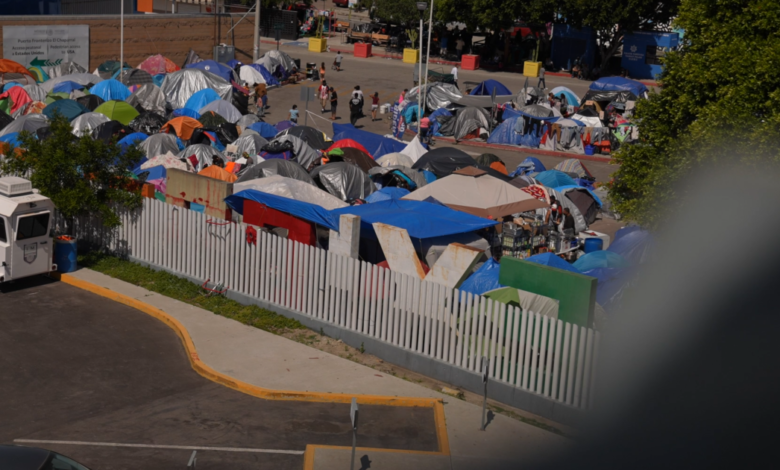
TIJUANA, Mexico -- Just after sunrise, the rust-colored border wall looks like a snake separating two lands.
For months, migrants have been traveling toward the United States with the hope of seeking a better life. Normally people can present themselves at the U.S. point of entry to request asylum if they’re fleeing from danger. Then they go through a process of having their case heard to see if it’s legitimate. However, current U.S. laws make it nearly impossible for migrants to seek asylum – leaving them stuck at the border.
Esperanza Encampment is the name of the migrant encampment at El Chaparral point of entry. According to Border Angels -- a nonprofit that advocates for human rights -- more than 2,000 people are living there with about eight new families arriving per day. Most of them are fleeing dangerous situations so very few of them feel safe showing their face on camera. One woman willing to show her face is Jessy. We are not sharing her last name for her protection. She left Honduras with two of her kids because their lives were threatened by gang members.
“The gang members entered our apartment and tied us up… they put our kids in danger and gave us three days to leave," Jessy said. "We had to flee from there, from the colony, because they wanted us to pay them 10,000 pesos." (In Spanish: "Las maras entraron a esto apartamento y nos amararron…pusieron a nuestros hijos en peligro y nos dieron tres días para que saliéramos. Huyéndose a que nos salieron de allí, de la colonia, porque querían que les pagáramos diez mil pesos.”)
Jessy says her kids have experienced a lot of trauma.
"My daughter actually had to go to therapy because they put a gun to her head when she was little…she was only 6 years old," Jessy said. "Truth is, it was very bad so we had to leave in a hurry." (In Spanish: Mi niña de hecho tuvo que estar en psicología porque a ella la pusieron la pistola en la cabeza y estaba pequeña…solo tenía seis años. La verdad, fue bien terrible y por eso nosotros teníamos que salir huyendo.”)
They’ve been at Esperanza Encampment for nearly 40 days.
“They're so close to the U.S. and yet still so far on their journey. So, um, I can't describe it in any other way except heartbreaking,” Border Angels executive director Dulce Garcia said.
Border Angels has been supporting the migrants with supplies.
“There’s still a need for food," Garcia said. "Ya know, basic things – food, tarp, blankets.”
Walking around the camp, Garcia shows us how the migrants have formed their own community. They have cooks, security guards and teachers for the kids.
Throughout the day, different church groups and other humanitarian organizations drop off food or something to drink. However, there’s still a huge need for drinkable water. Jessy says many kids have been getting sick.
"The majority of the camp has gotten sick," Jessy said. "The majority in the camp have the flu. They have coughs; most of the kids carry on like this.” (In Spanish: “La mayoría en el campamento se han enfermado. La mayoría en el campamento tienen gripa. Tienen tos, la mayoría de los niños andan todo así.")
These people say they're here because they’re desperate: fleeing political persecution, gang violence, domestic violence and some have lost their homes in hurricanes.
“The forces that are pushing people to leave their home countries have continued and have actually gotten worse with the pandemic,” Human Rights First legal fellow Julia Neusner said.
Human Rights First is an advocacy and action organization. Neusner has been documenting the stories of migrants for a report on a U.S. code that is keeping these migrants at the border.
“Because of Title 42, the border has been closed completely to asylum seekers completely since March 2020,” Neusner said.
Neusner says Title 42 is a rarely used U.S. law that gives government authority to exclude anybody who poses a public health risk to people in the United States. The Trump administration put it into place at the start of the pandemic. The Biden administration has yet to lift it.
“One of the first questions this woman asked us last night was 'how long is this going to take? How long do I have to wait here?' And the answer is, we don't know,” Garcia said.
Garcia says part of the reason there are so many people at the border now is because many have been given misinformation that Title 42 has been lifted.
“There are folks that prey on these people, and they tell them if you give me money, you're going to have your case heard,” Garcia said.
Now thousands of people are stuck in limbo hoping and praying for change.
“They're holding onto hope," Garcia said. "And that's why they camp has been renamed. Esperanza means 'hope' in Spanish. That's, that's all they have. Some of them literally, that's all they have.”
"The goal is that they get the border opened," Jessy said. "That they have compassion for us and let us in because while it is true that we are immigrants, we are not delinquents…We want to be able to work in the United States." (In Spanish: “La meta es que abran la frontera… que tengan compasión de nosotros y nos dejen entrar porque la verdad sí somos inmigrantes, pero no somos delinquentes...queremos ir y trabajar allí en los Estados Unidos”)







